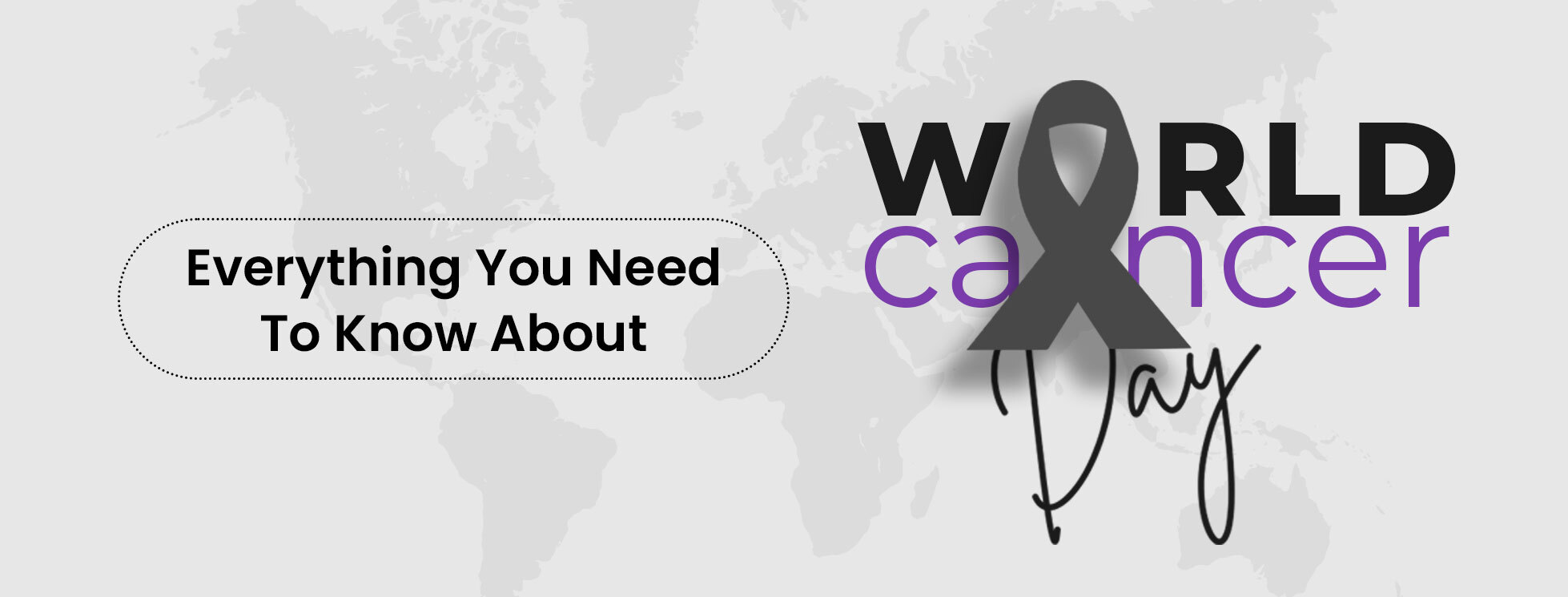As we observe World Cancer Day 2024, let’s take a moment to understand this complex disease that affects millions of people worldwide. In this blog we shall demystify cancer and explore how awareness can make a difference.
What is Cancer?
Cancer is a disease that involves uncontrolled growth and spread of abnormal cells in the body. It can develop in almost any organ or tissue and it is caused by genetic changes that alter the way cells function.
In simple terms, cancer is a condition where the normal, controlled process of cell growth goes wrong. Cells start growing uncontrollably, forming a mass or lump called a tumor.These cancer cells can invade nearby tissues and, in more advanced stages, spread to other parts of the body. The problem is that these rogue cells don’t follow the usual rules and can disrupt the normal functioning of organs and systems.
The History of Cancer
- The earliest known descriptions of cancer appear in Papyrus 7, discovered and deciphered late in the 19th century, providing the first direct knowledge of Egyptian medical practice.
- The disease was first called cancer by Greek physician Hippocrates (460-370 BC), who is considered the “Father of Medicine.”
- In the modern world, the study of cancer, called oncology, is the work of countless doctors and scientists around the world whose discoveries in anatomy, physiology, chemistry, epidemiology, and other related fields made oncology what it is today.
What are the types of Cancer?
There are two main categories of cancer:
- Hematologic (blood) cancers: The type of cancers that affect the blood, bone marrow and lymphatic system. For example, leukemia, lymphoma, and multiple myeloma.
- Solid tumor cancers: These are cancers of any other body organs or tissues, such as breast, prostate, lung, bone, muscles, colorectals, etc.
History of World Cancer Day:
2000: Inception
- World Cancer Day was first established on February 4, 2000, at the World Summit Against Cancer for the New Millennium in Paris.
2006: Global Movement
- The Union for International Cancer Control (UICC), a non-governmental organization, took the lead in promoting World Cancer Day globally.
Purpose of World Cancer Day:
- Raise Awareness: The primary purpose is to raise awareness about cancer, dispel myths, and educate individuals and communities about the disease.
- Promote Prevention: Emphasizes the importance of preventive measures, healthy lifestyles, and early detection in reducing the global burden of cancer.
- Inspire Action: Serves as a platform to inspire individuals, communities, and governments to take action against cancer through awareness, research, and support.
- Unite Global Efforts: Facilitates the collaboration of organizations, healthcare professionals, governments, and individuals worldwide to unite in the fight against cancer.
- Address Stigma and Myths: Aims to address the stigma associated with cancer and dispel myths, providing accurate information to reduce fear and encourage early detection.
- Support for Patients: Provides a platform to show solidarity with cancer patients, survivors, and their families, offering support, understanding, and encouragement.
- Advocate for Policy Change: Advocates for policy changes to improve cancer care, research funding, and access to treatment on a global scale.
Themes Over the Years:
Year | Theme | Description |
2009-2010 | Cancer can be prevented | Emphasized the importance of preventing cancer through awareness of preventive measures and lifestyle choices. |
2010-2011 | ‘I love my healthy active childhood’ | Promoted healthy and active childhoods to reduce cancer risks.. |
2012 | Together let’s do something | Highlighted the power of collective action in the fight against cancer. |
2013 | Cancer Myths – Get the Facts | Focused on dispelling cancer myths and providing accurate information. |
2014 | Debunk the Myths | Aimed to dispel myths surrounding cancer and educate people about its realities. |
2015 | Not Beyond Us | Emphasized that preventing and fighting cancer is achievable through collective efforts. |
2016-2018 | We can. I can. | Encouraged both collective and individual actions to reduce the global burden of cancer. |
2019-2021 | I Am and I Will | Stressed the power of individual action to impact the future of cancer, urging personal commitments to reduce its impact. |
2022-2024 | Close the Care Gap | Focused on recognizing global inequities in cancer care, raising awareness, and catalyzing actions for accessible, quality health services globally. |
Causes and risk factors of Cancer
10 major causes and risk factors of Cancer
1. Exposure to chemicals or other substances
Certain specific chemicals and substances such as those in tobacco smoke, can increase the risk of cancer.
2. Lifestyle behavior and environmental factors
Smoking, excessive alcohol consumption, air pollution, second hand smoke, being overweight or obese are all known to be risk factors of cancer.
3. Family history
A personal or family history of cancer can increase the risk of developing the disease, as it may be a sign of possible inherited cancer syndrome.
4. Aging
As we age, our body tends to lose the ability to eliminate cells with damaged DNA, causing an increased risk of cancer.
5. Exposure to radiations
High-energy radiation, such as x-rays, gamma rays, alpha particles, beta particles, and neutrons, can damage DNA and cause cancer.
6. Viral infections
Viral infections such as human papilloma virus (HPV) and hepatitis virus, are linked to an increased risk of cancer.
7. Poor diet
A diet high in processed and red meats, saturated and trans fats, and low in fruits and vegetables can increase the risk of cancer.
8. Physical inactivity
Lack of physical activity can increase the risk of cancer, as it can lead to obesity and other health problems.
9. Chronic inflammation
Chronic inflammation, which can be caused by infections or other factors, can increase the risk of cancer.
10. Hormones
Excess exposure to hormones like estrogen and testosterone can lead to an increased risk of breast and prostate cancer. They affect the body’s normal processes, such as cell division, differentiation, and the number of susceptible cells.
Cancer care and medical advances
- Advances in cancer therapy: There have been several advances in cancer therapy that are increasing prevention and survival rates and offering hope for a cure to more people. These include carbon ion therapy, which precisely targets and destroys cancer cells, and dynamic monitoring of the whole cancer from detection to interception to monitoring of resistance in metastatic cancer.
- Precision medicine: Precision medicine is an area of cancer research that is focused on developing personalized treatments based on a patient’s unique genetic makeup. This approach is expected to lead to more effective treatments with fewer side effects.
- New cancer treatments: Scientists are designing drugs to attack cancer based on its genetic makeup, which is leading to more effective treatments. Additionally, targeted immunotherapies and finding and treating cancer at an earlier stage are also promising areas of research.
- Technological innovations: Technologies such as Clustered Regularly Interspaced Short Palindromic Repeats (CRISPR), artificial intelligence, telehealth, the Infinium Assay, cryo-electron microscopy, and robotic surgery are revolutionizing cancer research and care. These technologies are helping researchers visualize, understand, and treat cancer more effectively.
- Genetic testing: Genetic testing is becoming more widely available and is helping doctors identify patients who are at a higher risk of developing cancer. This information can be used to develop personalized prevention and treatment plans.
- Robotic surgery and keyhole surgery: Over the past two years, India has witnessed a notable surge in onco-robotics, making it a leading nation in deploying robotics for cancer treatment, particularly in gynecological and urological cases.
Cancer awareness, prevention and early detection
“Cancer awareness, prevention, and early detection are crucial in the fight against cancer.”
- There are 62 Regional Cancer Centres in India, spanning all the states and union territories of the country.
- Projected increase in India’s cancer cases: 1.46M in 2022 to 1.57M by 2025.
- Only 15% and 33% of breast, cervical, and oral cancers being detected in the early stages
- Tobacco and Tobacco related Cancers have the highest awareness landscape in India.
- A study reported that 57.1% of participants were aware that cancers can be cured if detected at an early stage.
- Only 8.54% of rural women have a clear understanding of what cancer means.
- Reducing harmful habits like smoking, excessive alcohol intake and unhealthy diet can significantly reduce the risk of cancer.
- Adhering to recommended cancer screenings is essential for early detection and timely prevention.
- Making genetic testing widely available can help identify individuals with high risk, enabling personalized prevention and treatment plans.
Cancer Care and Treatment
- India has made progress in the distribution of oncology services, increasing access to care in historically underserved areas, which is expected to lead to better health outcomes for all Indians, not just those in urban areas.
- Significant progress has been made in cancer care and treatment, with advances in precision medicine, targeted immunotherapies, and advanced treatment technologies such as Image Guided Radiation Therapy (IGRT) and High Dose Rate (HDR) Brachytherapy.
- IGRT is a type of conformal radiation treatment that enables higher doses of radiation to be delivered to the tumor while minimizing harm to healthy tissue and reducing radiation side effects.
- HDR Brachytherapy is a form of internal radiation that is used to treat various cancers, including prostate, breast, lung, cervical, head and neck, sarcoma, and melanoma.
Conclusion:
As we mark World Cancer Day 2024, let’s pause to comprehend the intricacies of this global challenge affecting millions. Understanding the disease, its history, and the relentless pursuit of prevention, early detection, and advanced treatments are key steps in our collective fight against cancer. At Vydehi Cancer Center (VCC), we continue to help a large number of people with cancer every day. We have dedicated treatments for different types of cancer.
Vydehi Cancer Center (VCC) in Bangalore (accredited by NABH) is one of the first centers in India to commission IGRT (Image guided radiation therapy) with respiratory gating along with High Dose Rate (HDR) Brachytherapy. With our dedicated group of oncologists we are laying the path for prevention, early detection, treatment and cure of cancer.

